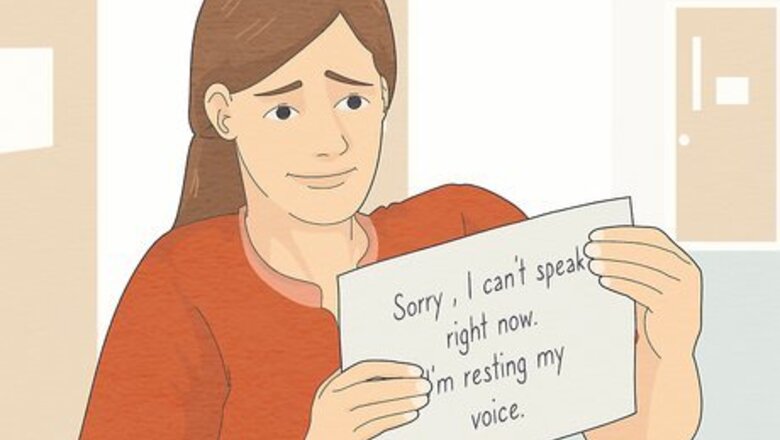
views
- Drink lots of water and warm fluids like decaffeinated herbal tea and broth to soothe your throat. Avoid beverages with alcohol and caffeine.
- Give your vocal cords plenty of rest. Avoid talking altogether when you can, or communicate in a soft voice—but avoid whispering.
- Set up a cool mist humidifier to keep the air moist, and breathe in steam using your shower or by heating up a pot of water.
- Gargle with salt water to lubricate your throat. Suck on throat lozenges or use chewing gum to keep your throat moist.
Rest your voice whenever possible.
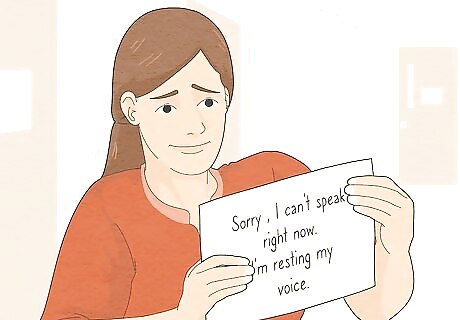
Rest is the most important thing you can do to speed up your recovery. When your voice is gone, either due to laryngitis, overuse, or other causes, it’s because your vocal cords are inflamed. Talking or singing will irritate your inflamed vocal cords, delaying your overall recovery. Try not to use your voice at all for at least a day, or speak softly when you must. To communicate, try texting and writing your words down on a whiteboard or notebook instead. If talking is unavoidable, do so only for short periods, and use a microphone or megaphone if you need to be loud. Get plenty of regular rest as well! Your body heals fastest when it gets 7 to 9 hours of sleep nightly.
Use your natural voice instead of whispering.
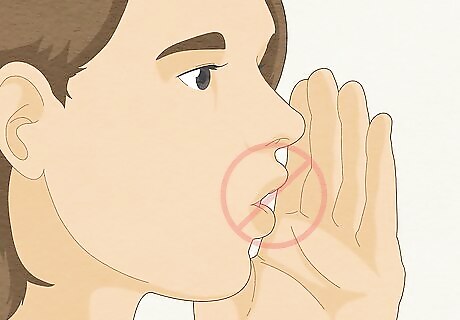
Whispering actually puts more strain on your voice than talking normally. Even if you have to talk while waiting for your voice to recover fully, don’t whisper; doing so will pull your vocal cords tight and irritate them more than they already are. Speak with your natural voice at a low volume rather than resorting to a whisper to ensure fast healing.
Drink plenty of water.
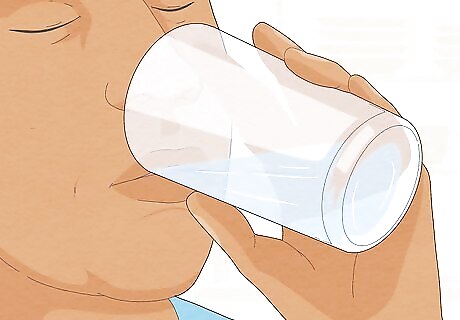
Water keeps you hydrated and moisturizes your airways. Keep your body well-hydrated by drinking water to restore your voice. Increasing fluid intake helps your throat produce a healthy amount of moisture, which in turn helps make your voice functional. In short, moisture is key to getting your voice back! Drink around 64 fluid ounces (1.9 L) each day, equivalent to 8 cups of water. Avoid drinks containing alcohol and caffeine while your vocal cords heal. Alcohol and caffeine (including drinks like coffee and black tea) dehydrate you, making your voice worse. Caffeine and alcohol can also induce acid reflux, which can cause or prolong laryngitis.
Sip warm tea and broth.

Warm liquids can soothe your throat and thin out any mucus there. Drinking decaffeinated herbal tea (and other warm liquids) will help hydrate you, while the heat and steam will reduce irritation in your throat. Plus, they’ll thin out the mucus in your throat, which makes it easier to use your voice. Most of the liquid you drink should be warm if possible, but ensure it’s not so hot that it scalds your throat. While it’s true that citrus drinks (including lemon tea) might not be the best for your throat, soothing teas like chamomile, licorice root, and ginger can help reduce inflammation.
Add honey to your warm drinks.

Honey acts like a cough suppressant to reduce irritation in your throat. Some evidence also suggests that it reduces mucus secretion and has antibacterial capabilities, which can help if you lose your voice due to a bacterial infection. Add 1 teaspoon (4.9 mL) of honey to each cup of tea you drink and stir it before drinking to enjoy a warm beverage with healing properties! If you don’t like many warm drinks, you could always eat a quick spoonful of honey instead.
Eat foods with ginger and garlic.
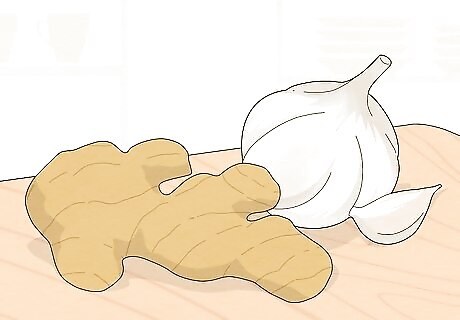
Ginger and garlic can both help relieve your respiratory symptoms. Eating ginger will help suppress your cough, and consuming garlic helps to prevent respiratory infections. Luckily, there are many ways to incorporate ginger and garlic into your diet. For example, add freshly-chopped ginger to teas and soups, and add garlic to sauces, stir-fries, and roasted vegetables. Generally, fruits (except citrus), vegetables, and whole grains are helpful in preventing acid reflux and keeping the mucus membranes of your throat healthy. It’s also a good idea to cut foods that worsen a sore throat from your diet. Acidic products like chocolate, citrus, and spicy foods cause acid reflux, which can cause or prolong laryngitis.
Inhale steam for your vocal cords.

Steam can moisten your vocal cords and clear away sticky mucus. Ensure you have plenty of moist air surrounding you while your voice recovers. One of the easiest ways to do this is to inhale steam from a pot of hot water! You can also add 1 to 2 drops of essential oil to the steaming water for an additional soothing effect.How to Steam Your Vocal CordsBring water to a boil. You can just do this on your stove.Take it off the stove once it’s boiling. Move it to a safe place, like a wood-cutting board.Place a towel over your head. Pull the sides of the towel taut, so it creates a little cave.Lean over the pot and inhale the steam. Do this for 10-15 minutes. You should start to feel your sinuses clearingRepeat twice a day.
Take a hot shower.
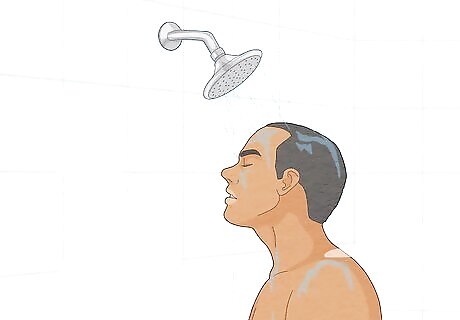
Hot showers create steam, which in turn will soothe your throat. Showers are another great way to use steam to restore your voice. Simply take a daily shower while suffering from laryngitis (or some other form of vocal loss). Close the bathroom’s doors and windows to accumulate as much steam as possible, and breathe deeply as you shower. If you want to repeat the process but already took a shower that day, you can also run the shower while sitting in your bathroom and take deep breaths instead.
Use a humidifier.
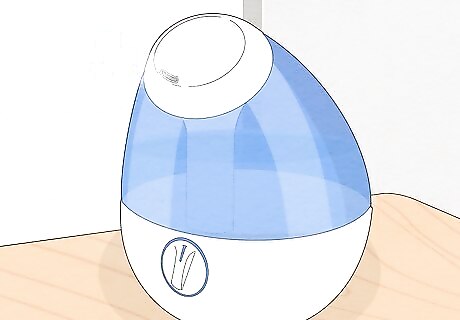
Humidifiers keep your airways moist, making your voice less hoarse. Invest in a cool mist humidifier and set it up in whichever room you’re spending time in, whether that’s an office, kitchen, bedroom, and so on. Make a point to keep it on in your bedroom overnight, too, as this will help your voice heal while you sleep! Aim to keep the air in your home around at least 30 percent humidity. This is especially important during winter when the air is drier (making it easier to irritate your throat).
Gargle with salt water.
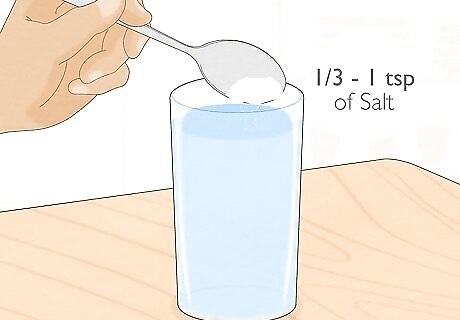
Salt water treats laryngitis by lubricating your throat and killing bacteria. Gargling also softens your vocal cords and speeds up the process of restoring your voice. You can gargle with room temperature water or heat the water in the microwave until it’s warm. Just remember to check that the water isn't too hot if you zap it in the microwave; scalding water might damage the lining of your throat.How to Gargle SaltwaterMix salt and water. Add ⁄3 to 1 teaspoon (1.6 to 4.9 mL) of salt to 8 fluid ounces (240 mL) of water. Using more salt will create a stronger solution.Gargle for 30 seconds. Hold a gulp of the solution in your mouth and tilt your head slightly back. Keep the back of your throat closed and gargle for a full 30 seconds.Repeat. Keep doing this until you gargle the entire solution. You can do this every 2 to 3 hours.
Suck on a throat lozenge.
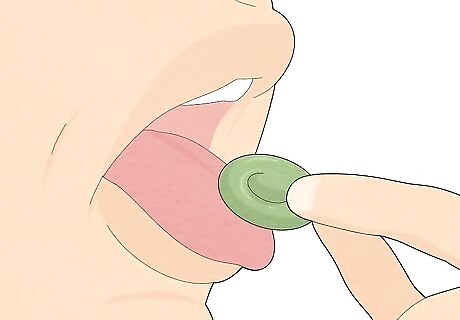
Lozenges increase saliva production, which adds moisture to your throat. Plus, many throat lozenges are made with menthol, which has cooling properties, or benzocaine, which is a local anesthetic. Both of them will make your throat feel less painful while it heals, whether you’re dealing with laryngitis or irritation due to a dry environment. Read the package to check how many lozenges you can have daily, which may vary based on the type you decide to get.
Chew on a piece of gum.
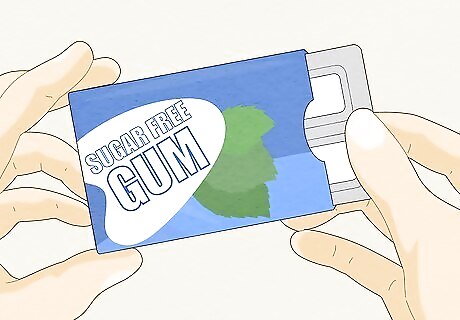
Gum works like lozenges, moistening your throat and reducing irritation. Carry a few sticks of chewing gum around with you and chew it periodically to ease the pain in your throat (and help your voice recover). The more your mouth and throat stay lubricated and hydrated, the better off you'll be!
Steer clear of cigarettes and smoke.
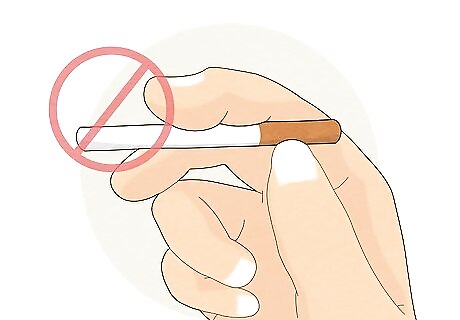
Smoke causes throat inflammation, which will worsen your symptoms. Not only that, but smoking dries out your esophagus, which is the last thing you want when your voice is gone! Avoid smoking or inhaling secondhand smoke while your voice recovers, and if you smoke, consider quitting entirely for your general (and vocal) health. If you can’t stop smoking on your own, try using nicotine patches to get you started. Quitting smoking also saves you money and reduces your risk of developing several health issues, including heart disease and lung and bladder cancer.
Use over-the-counter NSAIDs to relieve symptoms.
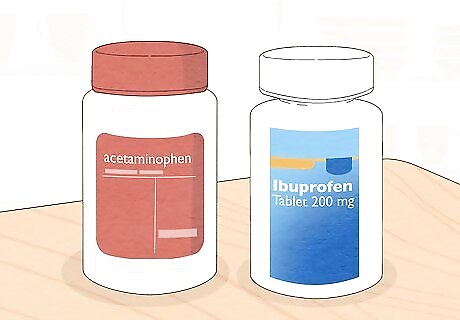
Pain relievers like acetaminophen have anti-inflammatory properties. Try an over-the-counter drug to manage throat discomfort and ease the inflammation of your vocal cords. Solid options include Acetaminophen (the active ingredient in Tylenol) and NSAIDs (non-steroidal anti-inflammatory drugs) like Ibuprofen. Follow all instructions on the bottle and take only as much as necessary! Steer clear of decongestants, which can be helpful when your sinuses are clogged but will ultimately dry out your throat.
Talk to a doctor about medication.
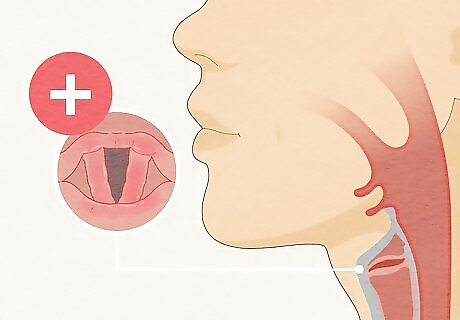
Doctors can prescribe medicine, including antibiotics or corticosteroids. Losing your voice often won’t warrant a doctor's visit. Even laryngitis is treatable at home and typically resolves within a week. However, if a bacterial infection causes it, your doctor can prescribe antibiotics to help. Alternatively, your doctor may prescribe corticosteroids to reduce inflammation in your throat. Keep in mind that corticosteroids aren’t for everyone and usually aren’t prescribed unless there’s an urgent need to treat laryngitis. Your doctor will be able to make the final call! Many cases of laryngitis are viral (caused by a cold) rather than bacterial, which is why antibiotics are only helpful in specific instances. See a doctor if your laryngitis lasts longer than 2 weeks or if your symptoms are painful and cause trouble swallowing. It might mean you have chronic laryngitis or laryngitis caused by acid reflux, which requires treatment.



















Comments
0 comment